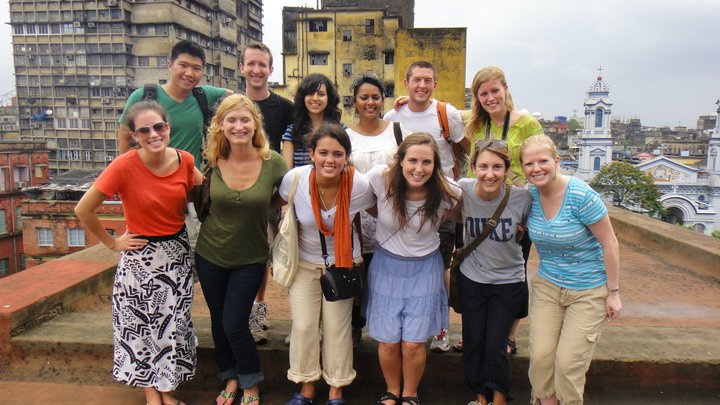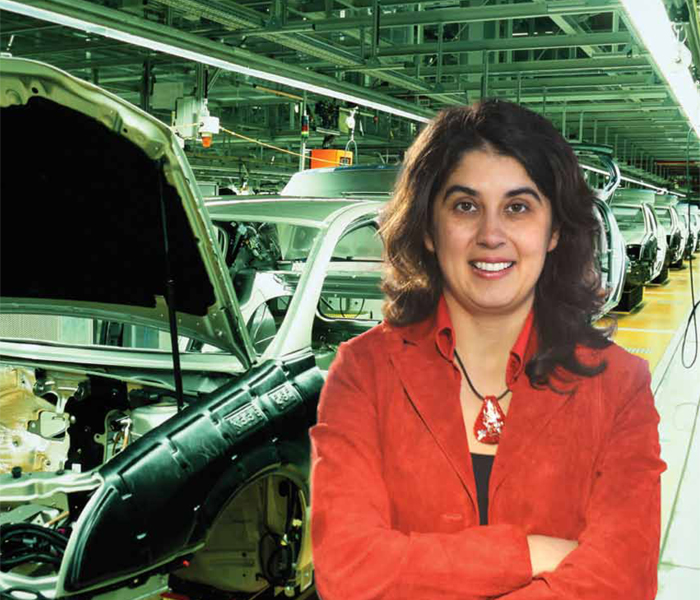By Kami L. Rice
Baishakhi B. Taylor and Darina Lepadatu became fast friends when their paths converged at UK nearly 10 years ago. The two women, from India and Romania, respectively, were among the few international students in UK’s sociology Ph.D. program. As Lepadatu notes, they went through the American acculturation process together. They even have young daughters who are almost the same age, deepening the bond between the two women. Both scholars have recently taken on new roles at their universities, and they credit the preparation they received at UK.
The Administrative Route can be the right track
On first glance, Baishakhi B. Taylor’s new job doesn’t appear to be a wise choice for a research-minded sociologist. But Taylor says her sociology background has been key preparation for the position she stepped into last year at Duke University. In her role as academic dean, she oversees the academic and intellectual progress of first and second-year students, serving all students in one of four neighborhoods into which entering students are grouped. Currently, she is academic dean for 716 students whom she advises until they declare a major. The role means she works one-on-one with students, faculty, parents, and partners all across Duke’s campus. Taylor regularly meets with as many as 10 students a day in 30-minute to one-hour appointments.
Working with students in this way is very fulfilling, says Taylor. “The first two years are a big landmark in students’ lives, [and] students want to get the best of the Duke experience.” She gets to support them in doing just that.
“Sociology as a discipline is so comprehensive,” she notes, and it has helped her ability to navigate the social dynamics of work with students, preparing her to understand where they are coming from, including how various socio-economic factors impact them.Though Taylor defended her dissertation in February 2008, she began working in a research role at Duke in 2006 when her husband began grad school in North Carolina.
Now, in addition to her academic dean role, she serves as director of Duke’s new Peer Advising Program and director of the Duke Engage Program in Calcutta, India.

For the past three summers, Taylor has earned grants, including a Fulbright grant and Duke Engage funds, to travel to India, her homeland and where she earned a bachelor’s and master’s degree before coming to the United States for further graduate work. In most cases, students have traveled with her.
Photo: Baishakhi B. Taylor’s civic engagement group in Calcutta, India summer of 2011.
In addition to her administrative roles, Taylor also has a faculty appointment that allows her to do research despite not being in a tenure track position. Taylor’s current research includes work with a colleague at Columbia University on issues around sexuality in India. While the two researchers have already done initial analysis of data collected in Calcutta, they will collect more data this summer. Taylor has also taken elementary teachers and education students from the States to India. Upon their return they develop elementary school global learning curriculum reflecting what they observed in Indian schools.
While Taylor’s non-tenure track trajectory was an evolution rather than a plan from the beginning, she says, “I think it’s been a good journey for me,” adding, “I feel like I got the best of both worlds. I am still in academia and still pursuing research, but I am a lot more grounded and not working only inside the scholarly bubble. I get to work with people and what better [work] is there than that for a sociologist.”
Taylor is effusive in her praise of the preparation her time at UK gave her for her current work. Because of the valuable impact her advisor Dr. Tom Janoski had on her, she regularly tells students considering grad school that “your Ph.D. advisor can change your career.” She also notes that Dr. Jim Hougland was very supportive. “The journey to a Ph.D. is very challenging, and I had my share of challenges. Dr. Hougland supported me through that.” She says she can’t give enough credit to UK for having faculty mentors of such high caliber.
When a career comes together, it’s a beautiful thing
When Lepadatu learned recently that she will be promoted this fall from assistant professor to associate professor of sociology after five years at Kennesaw State University, located outside Atlanta, Janoski was the first person she called. “Our relationship didn’t end with graduation,” she says of her UK mentor who she credits as being the most influential person in her career. She continues to collaborate with him since defending her dissertation in 2007.
The two have published one book together and are working on a second, doing research on the auto industry and the maturing of lean production, which is the Japanese management style that has become the industry’s dominant model. A National Science Foundation research grant has funded their study entitled “Lean Production in Japanese Transplants and American Auto Plants: Processes of Management Control and Worker Identity in Causing Stress.”
For the past two years, Lepadatu has also served as associate director of KSU’s Ph.D. program in international conflict management. She has loved helping build KSU’s first Ph.D. program and her voice glows with excitement as she notes, “I can talk forever about this.” The program is the only Ph.D. program in the United States that focuses on international conflict management. Thus, prospective students apply from around the world. The 30 students in the first two cohorts represent 28 countries.
 Photo courtesy of Kennesaw State University Magazine
Photo courtesy of Kennesaw State University Magazine
The program is interdisciplinary and is led by a team of scholars who look at conflict from multiple perspectives across the full range of the social sciences. For example, Lepadatu’s colleague who serves as director of the program is a German political scientist. “It’s very exciting to work with this international team of scholars,” notes Lepadatu. “[The program] is innovative and dynamic.”
The new program highlights KSU’s vision to position itself as Georgia’s international university, a university that already boasts many international faculty members and encourages faculty to develop global partnerships. Because of this, says Lepadatu, “Ever since I’ve been here I’ve felt that this is a second home for me.”
When Lepadatu first arrived at UK, she wanted to disassociate herself from her Romanian background because she didn’t want to limit her research options and because research on post-communist societies was less in vogue by then. Thus, her research in the auto industry, which she began at UK, has international elements but doesn’t reflect her Eastern European heritage. However, since joining KSU’s faculty, the school’s international focus has prompted her to start publishing more on Romania, including papers on migration and security topics, such as the expulsion of the Romanian Roma from fellow EU nations Italy, Spain and France.
In addition to including Romania in her research interests, during the past academic year, Lepadatu also coordinated the Year of Romania Program at KSU. The academic program promoted Romania in the United States and included weekly events and lectures on Romanian culture and civilization, including a film festival, food tasting, art exhibits, concerts, academic lectures and a study abroad trip with 30 students who completed fieldwork in Romania.
Lepadatu credits Janoski for helping her see her international background as a real asset. When she arrived at UK, she felt her command of English wasn’t good enough and her self-esteem was low. But Janoski encouraged her to build an international research agenda, and from early on her research has had international angles. Before coming to UK, she also served for three years as a European integration specialist with the Romanian Ministry of Education and Research, working to prepare Romania’s education system for accession to the EU.
Her position with KSU’s international conflict management Ph.D. program, says Lepadatu, “is a culmination of all my previous work and my career at this point, but I would not be here without the solid training and dedicated mentorship that I was privileged to receive during my graduate experience in the Sociology Department at UK. Graduate School at UK was the best time of my life so far.”
